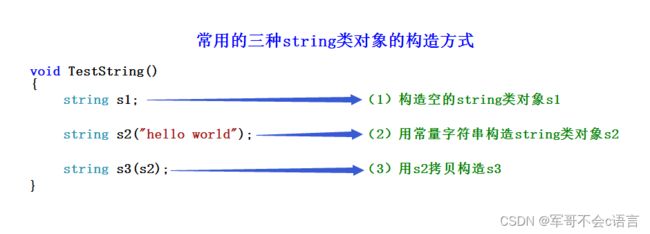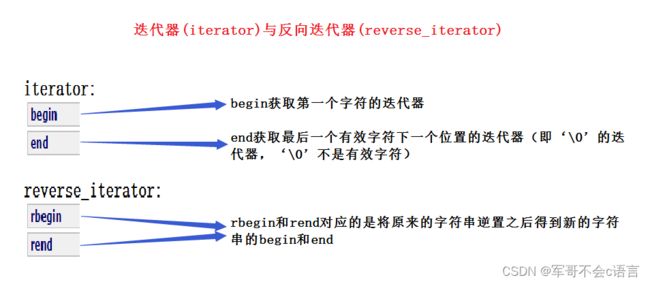【c++】string类的使用
目录
一、标准库中的string类
1、简单介绍string类
2、string类的常用接口注意事项
2.1、string类对象的常用构造
2.2、string类对象的容量操作
2.3、string类对象的访问及遍历操作
2.4、string类对象的修改操作
二、string类的模拟实现
一、标准库中的string类
1、简单介绍string类
(1)string是表示字符串的字符串类;
(2)string类的接口与常规容器的接口基本相同,在添加了一些专门用来操作string的常规操作;
(3)string的底层实际是:basic_string模板类的别名,typedef basic_string
(4)不能操作多字节或者变长字符的序列。
2、string类的常用接口注意事项
2.1、string类对象的常用构造
标准库给出的string类对象常用的构造函数有很多,我们经常用到的主流构造方式有三种:用模板提供的默认构造函数构造空的string类对象、用常量字符串构造string类对象以及用现有的string类对象进行拷贝构造string类对象。
2.2、string类对象的容量操作
(1)size()与length()方法的底层实现原理完全相同,引入size()的原因是为了与其他容器的接口保持一致,一般情况先都是用size()。
(2)clear()只是将string类对象中的有效字符清空,不改变底层空间大小。
(3)resize(size_t n)与resize(size_t n,char c)都是将字符串中的有效字符个数改变成n个,不同的是当字符个数增多时:resize(n)用0来填充多出来的元素空间,resize(size_t n,char c)是用字符c来填充多出来的元素空间。注意:resize()在改变元素个数时,如果是将元素个数增多,可能会改变底层容量的大小,如果是将元素个数减少,底层空间的总大小保持不变,并不会随着元素个数的减少而缩小容量空间。
(4)reserve(size_t res_arg=0):为string预留空间,不改变有效元素个数,当reserve的参数小于string的底层空间总大小时,reserve不会改变容量的大小。
2.3、string类对象的访问及遍历操作
string类对象的访问方式有三种:下标访问、迭代器访问、范围for访问。这里主要讨论迭代器访问方式。
迭代器是一个类,现阶段可以把迭代器当成一个指针来使用(实际上不一定是指针),迭代器是在类的里边定义的,即内部类,使用方式如:string::iterator。string类中与迭代器搭配使用的成员函数包括begin()、end()、rbegin()、rend()。
2.4、string类对象的修改操作
string类提供了很多字符串修改接口,需要说的是:在string尾部追加自字符时,s.push_back(c)/s.append(1,c)/s+='c'三种实现方式几乎一样,一般情况下更多的选用+=操作,+=操作不仅可以连接单个字符,还可以连接字符串;对string操作时,如果能够大概预估到待存储字符串的长度,可以先通过reserve把空间预留好。
二、string类的模拟实现
#pragma once
#include
using namespace std;
#include
namespace lbj
{
class string
{
friend ostream& operator<<(ostream& _cout, const string& s);
friend istream& operator>>(istream& _cin, string& s);
typedef char* iterator;
public:
string(const char* str = "")
{
_size = strlen(str);
_capacity = _size;
_str = new char[_capacity + 1];
strcpy(_str, str);
}
string(const string& s) : _str(nullptr), _size(0), _capacity(0)
{
string tmp(s._str);
this->swap(tmp);
}
string& operator=(const string& s)
{
if (this != &s)
{
string temp(s);
this->swap(temp);
}
return *this;
}
~string()
{
if (_str)
{
delete[] _str;
_str = nullptr;
}
}
//
// iterator
iterator begin()
{
return _str;
}
iterator end()
{
return _str + _size;
}
/
// modify
void push_back(char c)
{
if (_size == _capacity)
reserve(_capacity * 2);
_str[_size++] = c;
_str[_size] = '\0';
}
string& operator+=(char c)
{
push_back(c);
return *this;
}
void append(const char* str)
{
int len = strlen(str);
if (_size + len > _capacity)
{
reserve(_size + len);
//_capacity = _size + len;
}
strcpy(_str + _size, str); //strcpy()会将‘\0’也拷贝过来,所以不需要手动添加'\0'
_size += len;
}
string& operator+=(const char* str)
{
append(str);
return *this;
}
void clear()
{
_size = 0;
_str[_size] = '\0';
}
void swap(string& s)
{
std::swap(_str, s._str);
std::swap(_size, s._size);
std::swap(_capacity, s._capacity);
}
const char* C_Str()const
{
return _str;
}
/
// capacity
size_t size()const
{
return _size;
}
size_t capacity()const
{
return _capacity;
}
bool empty()const
{
return _size == 0;
}
void resize(size_t newSize, char c = '\0')
{
if (newSize > _size)
{
// 如果newSize大于底层空间大小,则需要重新开辟空间
if (newSize > _capacity)
{
reserve(newSize);
}
memset(_str + _size, c, newSize - _size);
}
_size = newSize;
_str[newSize] = '\0';
}
void reserve(size_t newCapacity)
{
// 如果新容量大于旧容量,则开辟空间
if (newCapacity > _capacity)
{
char* str = new char[newCapacity + 1];
strcpy(str, _str);
// 释放原来旧空间,然后使用新空间
delete[] _str;
_str = str;
_capacity = newCapacity;
}
}
/
// access
char& operator[](size_t index)
{
assert(index < _size);
return _str[index];
}
const char& operator[](size_t index)const
{
assert(index < _size);
return _str[index];
}
/
//relational operators
bool operator<(const string& s)const
{
int res = strcmp(_str, s._str);
if (res < 0)
return true;
return false;
}
bool operator<=(const string& s)const
{
return !(*this > s);
}
bool operator>(const string& s)const
{
int res = strcmp(_str, s._str);
if (res > 0)
return true;
return false;
}
bool operator>=(const string& s)const
{
return !(*this < s);
}
bool operator==(const string& s)const
{
int res = strcmp(_str, s._str);
if (res == 0)
return true;
return false;
}
bool operator!=(const string& s)const
{
return !(*this == s);
}
// 返回c在string中第一次出现的位置
size_t find(char c, size_t pos = 0) const
{
for (size_t i = pos; i < _size; ++i)
{
if (_str[i] == c)
return i;//找到,返回下标
}
return -1;//未找到
}
// 返回子串s在string中第一次出现的位置
size_t find(const char* s, size_t pos = 0) const
{
assert(s);
assert(pos < _size);
const char* src = _str + pos;
while (*src)
{
const char* match = s;//如果不匹配,返回子串起始处重新查找
const char* cur = src;
while (*match && *match == *cur)//结束条件
{
++match;
++cur;
}
if (*match == '\0')//找到子串
{
return src - _str;//返回下标
}
else
{
++src;
}
}
return -1;//未找到
}
// 在pos位置上插入字符c/字符串str,并返回该字符的位置
string& insert(size_t pos, char c)
{
assert(pos <= _size);
if (_size > _capacity)
{
//扩容
char* newstr = new char[_capacity * 2 + 1];//开空间
strcpy(newstr, _str);
delete[] _str;
_str = newstr;
_capacity *= 2;
//Expand(_capacity * 2);
}
//移数据
for (int i = _size; i >= (int)pos; --i)
{
_str[i + 1] = _str[i];
}
_str[pos] = c;
_size++;
return *this;
}
string& insert(size_t pos, const char* str)
{
size_t len = strlen(str);
if (_size + len > _capacity)//扩容
{
//扩容
char* newstr = new char[_capacity * 2 + 1];//开空间
strcpy(newstr, _str);
delete[] _str;
_str = newstr;
_capacity *= 2;
//Expand(_size + len);
}
//后移数据
for (int i = _size; i >= (int)pos; --i)
{
_str[len + i] = _str[i];
}
//拷贝字符串
while (*str != '\0')
{
_str[pos++] = *str++;
}
_size += len;
return *this;
}
// 删除pos位置上的元素,并返回该元素的下一个位置
string& erase(size_t pos, size_t len)
{
assert(pos < _size);
if (pos + len >= _size)//pos位置之后全为0
{
_str[pos] = '\0';
_size = pos;
}
else
{
strcpy(_str + pos, _str + pos + len);
_size -= len;
}
return *this;
}
private:
char* _str;
size_t _capacity;
size_t _size;
};
//输入流重载
istream& operator>>(istream& _cin, string& s)
{
//预分配100个空间
char* str = (char*)malloc(sizeof(char) * 100);
char* buf = str;
int i = 1;
//预处理:跳过流里面的所有空格和回车
while ((*buf = getchar()) == ' ' || (*buf == '\n'));
for (; ; ++i)
{
if (*buf == '\n') //回车跳出
{
*buf = '\0';
break;
}
else if (*buf == ' ') //空格跳出
{
*buf = '\0';
break;
}
else if (i % 100 == 0) //空间不足
{
i += 100; //追加100个空间
str = (char*)realloc(str, i);
}
else //每次getchar()一个值
{
buf = (str + i);//为了避免realloc返回首地址改变,不使用++buf,而是用str加上偏移.
//每次读取一个字符
*buf = getchar();
}
}
//输入完成,更新s
s._str = str;
s._capacity = s._size = i;
return _cin;
}
//输出流重载
ostream& operator<<(ostream& _cout, const string& s)
{
for (size_t i = 0; i < s.size(); ++i)
{
_cout << s[i];
}
return _cout;
}
}; 


